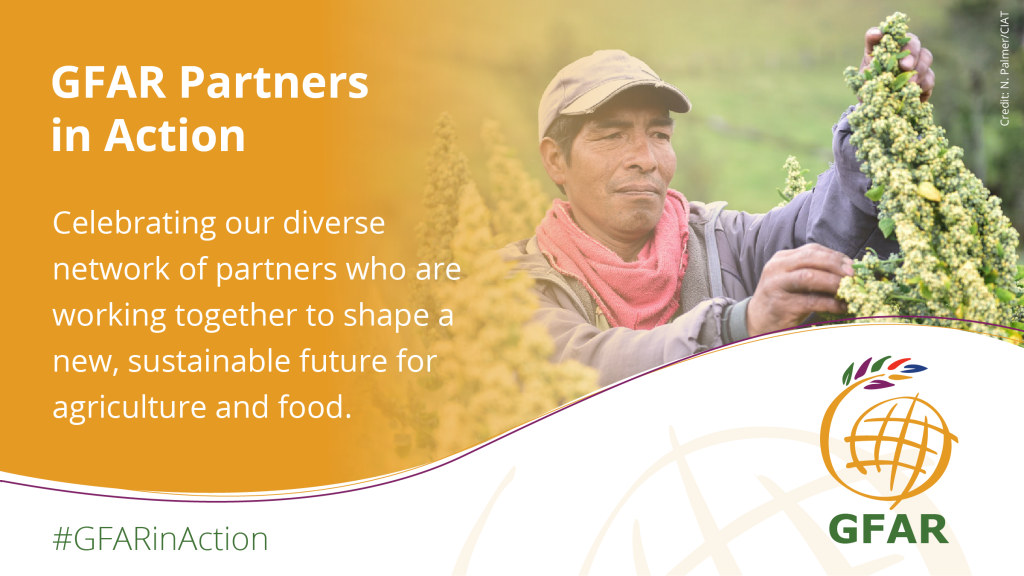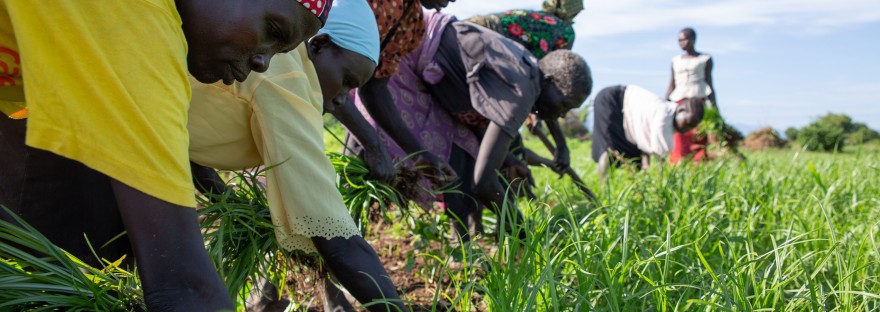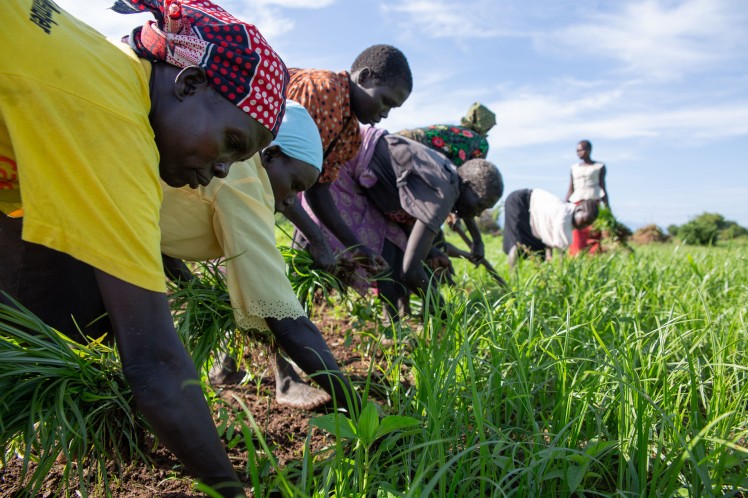GFAR is revitalizing Collective Actions to strengthen agri-food research and innovations systems, fueled by a new collaboration showcasing GFAR Partners’ unique way of working together.
As an open, collective movement, GFAR enables inclusive dialogue and Collective Actions to transform systems and processes of agri-food research and innovation. GFAR Secretariat and the wider GFAR network of partners are now renewing our work, with the confidence that together we can do what no one institution can do alone.
Collective Action: A multi-stakeholder programme of work at national, regional or international level initiated by three or more Partners and proritized by the Partners in the Global Forum, always including producers and with a particular focus on women and youth.
We in the GFAR Secretariat are pleased to announce the GFAR Partners in Action campaign, celebrating the achievements of our diverse network of partners who are working together to shape a new, sustainable future for agriculture and food. Through a new collaboration with Cultivate Communications, each month we will be showcasing stories submitted by Partners in GFAR related to a key theme in agri-food research and innovation.
With Cultivate Communications’ team of experienced strategists, creatives and storytellers on board, the aim of the GFAR Partners in Action campaign is to put the spotlight on partners’ contributions with greater reach, virality and impact. To kick it off, we will be sharing stories coming out of our current Collective Actions within our key focus area on Empowering Farmers at the Center of Innovation.
The GFAR Way: Putting the how into agri-food research and innovation
The Partners in GFAR know that our common vision to make agri-food research and innovation systems more effective, responsive and equitable can only be realized if we effect a change in the way we work. In GFAR, partnership is more than a word, it’s what makes our forum unique—our added value lies in how we take action together.
As we embark on a new, targeted set of Collective Actions prioritized by our Steering and Executive Committees along with the Swiss Commission for North/South Research Partnerships for their value in addressing today’s particular global challenges, GFAR’s multi-stakeholder partnership principles will be rigorously applied:
📝 Setting the agenda together. This ensures equity in cooperation and shared ownership of questions, ideas, priorities, approaches and methods.
🔄 Agreeing on knowledge flows and communication plans from the outset. This ensures transparent and easy access to information by all.
🤝 Negotiating and sharing responsibilities. The comparative advantages, competencies, preferences and social obligations of each partner are taken into account.
💡 Building a learning culture. Mutual learning from Collective Actions focuses not only on successful outcomes but also on shortcomings, failures and unachieved objectives.
💪 Enhancing collective research and innovation capacities. The partnership allows translation of personal knowledge acquired into sustainable institutional capacities.
👐 Sharing advantages equitably. This requires equal acknowledgement among all actors and fair allocation of benefits to all partners.
🌟 Disseminating results broadly to ensure application. This implies an effort to identify potential users of results and involving them from inception, entering into constant dialogue with them, and adapting communication to a variety of cultures and languages.
✅ Guaranteeing sustainability. The funding and human resources needed to carry forward the Collective Action is part of a collective strategy designed by all partners.
GFAR Collective Action on Inclusive Digital Transformation of Agriculture
With several international days on the theme of information and communication technologies fast approaching this April—including the International Girls in ICT Day and World Intellectual Property Day—the GFAR Partners in Action campaign will get underway with the theme of Digital Agriculture.
Digital Agriculture (DA) is expected to increase agricultural production and productivity, help adapt to and mitigate the effects of climate change, bring about more economic and efficient use of natural resources, reduce risk and improve resilience in farming, and make agri-food market chains much more efficient. However, farmers in general and smallholder farmers in particular are not harnessing the benefits of the digital transformation. The lack of inclusion of farmers in the design and governance of DA processes widens the gap between bigger and smaller actors in the DA value chain, and discourages small farmers from fully embracing DA. Consequently, the benefits that DA could bring to the efficiency, transparency and equity of agri-food value chains, as well as to climate change mitigation and adaptation, are not being realized.
To address these challenges, Partners in GFAR have started an action on Inclusive Digital Transformation of Agriculture. The first phase will be launched in Latin America and the Caribbean led by Forum of the Americas for Agricultural Research and Technology Development (FORAGRO) and co-designed and co-implemented with World Farmers’ Organization (WFO). A scaling out and replication phase is foreseen towards the end of 2021. Read more here.
GFAR Collective Action on Forgotten Foods
In May, global events drawing attention to the importance of biodiversity—including the International Day for Biological Diversity—provide an opportunity for interested Partners in GFAR to highlight their work to promote neglected and underutilized crop species, or “forgotten” crops and foods.
Forgotten crops and the foods derived from them have immense nutritional, cultural and consumer significance. They provide healthy foods for local communities which underpin their traditional practices. They afford them resilience to changing weather patterns, climate change, pests and diseases, thanks to their inherent robustness. What’s more, they constitute rich diversity in agro-ecosystems and landscapes, and protect farmers’ livelihoods by giving them a greater number of species to choose from when rotating their crops.
Yet, the smallholder farmers and indigenous people who have for centuries been custodians of this rich biodiversity have been left behind by formal agricultural research. Despite their long, painstaking work to select, conserve and improve these crops, most remain neglected, under-resourced, and underutilized in the broader global food system, and their knowledge systems disregarded. As a consequence, their use has declined over time.
Farming communities need to be recognized as custodians of traditional knowledge, agents of change and partners for innovative practices and products to make transformation sustainable and to strengthen their self-esteem and self-confidence as fully-fledged actors of innovation. They must also be empowered to derive fair returns to guarantee their long-term success and livelihoods.
To set in motion a fundamental change in the processes of knowledge generation and governance around these crops, GFAR has formed partnerships with several organizations ready to mobilize action for and with smallholders to within their own communities and countries. Learn more about the GFAR Collective Action on Forgotten Foods here.
Join the conversation
We encourage you to join the conversation and share your thoughts in the comments section of each blog throughout the campaign and use #GFARinAction on social media. Stay tuned for much more to come each month:
2021
2022
| Month | Theme |
| January | Soil and land data to support improved sustainability and FAIR access |
| February | Climate-smart innovations in agriculture |
| March | Creating change: Gender Transformative Approaches in agriculture |
| April | Forgotten foods for better nutrition |
| May | Small-scale family farming in an era of change |
| June | Natural resource management for sustainable agriculture in the context of climate change |
| July | Innovative approaches to partnership |





What a great Blog, I love the farming a-lot and my grand father was a great farmer in this time, mt Dad is a business man but in his blood still we can see the farming, He recently invented a great Optional accessories MULTI-FUNCTION TOOLS that will help farmers to achieve great food in time and on time.